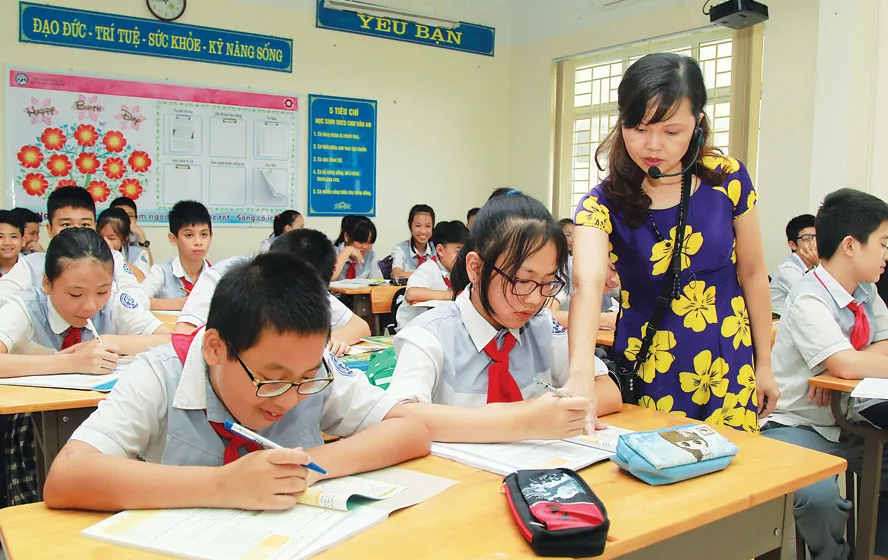Hanoi’s education sector maintains its leading position in the country
The capital city will promote education quality to meet national and international standards.
Hanoi's education sector maintains its leading position in the country, Deputy Director of the municipal Department of Education and Training Nguyen Quang Tuan said at a conference this week to discuss the results of the academic year 2021-2022.
According to Tuan, by the end of June 2022, the whole city has 2,835 schools with more than 2 million students in grades one to 12, and 120 universities and colleges with nearly 1 million students, in addition to nearly 300 vocational training institutions with 192,590 students.
"The facilities, equipment and application of information technology for teaching and learning in schools continue to receive investment in the direction of standardization, synchronization and modernity," said the deputy director.
A foreign language lesson for students at Chu Van An Secondary School in Hanoi's Thanh Tri District. Photo: Viet Thanh |
“The sector’s highlight is the improvement of education quality at all levels. Students in the capital city have affirmed their leading position in the country in national and international competitions with 125 students winning prizes at National Excellent Student Competitions, including 7 first prizes and 37 awards. At international competitions, Hanoi's students continue to prove their talents with 63 medals and awards,” Tuan added.
There is a strong focus on the building of national standard schools and high-quality schools. As of June 2022, the rate of schools meeting national standards in the whole city is 64.3%; the preparation and investment in building seven advanced and modern inter-schools with an area of 5 hectares or more in the city have been deployed.
Qualifications of managers and teachers at all levels of Hanoi meet and exceed standards in accordance with the Education Law 2005. The city has paid attention to training foreign languages for teachers in line with international standards.
At the meeting, Deputy Minister of Education and Training Nguyen Huu Do affirmed his view that Hanoi is a locality with many leading, pioneering and typical initiatives in education and training nationwide.
He suggested that Hanoi's education sector continue to focus on improving quality coincided with plans to deal with the potential risks of the pandemic, effectively implementing the General Education Program, taking care of the teaching staff, building national standard schools, as well as renewing the school administration.
Speaking at the conference, Deputy Secretary of the Hanoi Party Committee Nguyen Van Phong highly valued the effort, responsibility and initiative of the capital city’s education sector in the past school year.
Praising the respectable results of the whole sector, Phong also mentioned a number of limitations and shortcomings that require solutions to overcome such as school psychology problems, relationships between family-school-society, and the shortage of facilities, among others.
"Plans to train teachers, develop Hanoi's education should be drawn up so that it is on a par with that of other capitals of major countries in the region and the world," Phong stressed.











